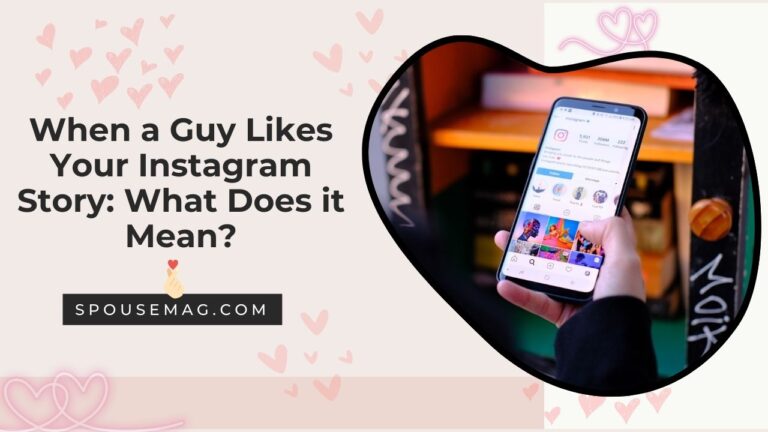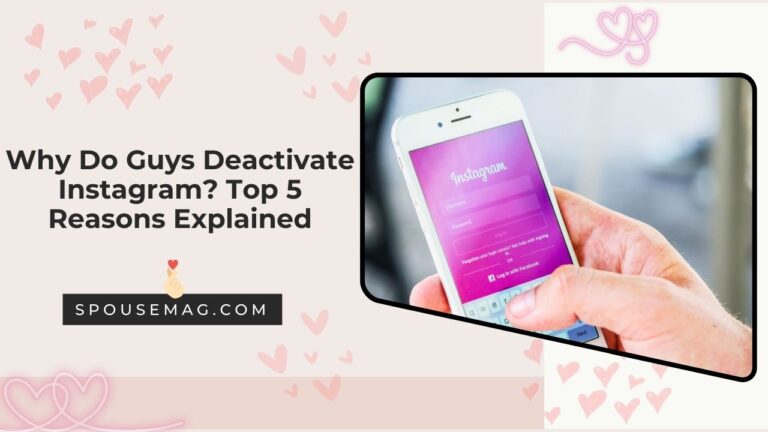
Ever noticed your boyfriend or husband showering you with more affection lately? Maybe he’s initiating more hugs, offering thoughtful gestures, or simply expressing his love more openly. While it’s a wonderful feeling, it can also leave you wondering: “Why is he suddenly so affectionate?”
In this article, we’ll shed light on the reasons why a guy might become more affectionate in a relationship.
We’ll explore the various factors at play, the different ways men express their love, and how you can navigate this positive shift in your connection.
Real-Life Stories: Saachi And Nancy
Saachi, a software engineer working at a tech startup, reflects on her experiences balancing work and relationships. “Sometimes, it feels like I’m constantly juggling deadlines and meetings, and there’s hardly any time left for personal connections,” she shares. Saachi finds solace in her partner’s affectionate gestures, seeing them as a way to feel supported and loved amidst the chaos of her professional life. “When my boyfriend surprises me with a hug or a sweet text message during a hectic day, it means the world to me,” she confesses.
On the other hand, Nancy, a busy doctor at a bustling urban hospital, offers her perspective on affection in relationships. “Being a doctor is both rewarding and demanding, but it can also be emotionally draining,” she reveals. Nancy finds herself constantly immersed in the needs of her patients, leaving little energy for personal matters. Yet, when her partner shows increased affection, Nancy feels a renewed sense of connection and intimacy. “It’s like he understands the struggles I face at work and wants to provide support in any way he can,” she explains.
When a Guy Becomes More Affectionate: 7 People’s Views
I talked to 7 people from different walks of life about the topic. Here’s what they had to say:
1. Michael, Salesman, 35, New York City
Michael believes that when a guy becomes more affectionate, it’s a sign of genuine growth in the relationship. “Maybe he’s finally realizing the importance of showing love and appreciation,” Michael muses. However, Michael also warns that sudden affection feels forced or insincere. “Sometimes guys overcompensate to cover up other issues,” he adds.
On the flip side, Michael suggests considering external factors influencing increased affection. “Maybe he’s going through a tough time at work or with family,” he speculates. Overall, Michael emphasizes the need for open dialogue to understand the underlying reasons behind the change in behavior.
Read More:
- What it Means When a Guy Looks You Up and Down: The Head-to-Toe Scan
- When a Guy Ghosts a Girl He Likes? Top 6 Reasons Revealed
- When a Guy Asks Me My Goals? Is He Interested or Just Curious
2. Emily, Nurse, 27, Chicago
Emily sees increased affection as a positive sign of emotional maturity. “It shows that he’s willing to invest more in the relationship,” she notes. For Emily, affection is vital for a healthy connection with a partner. She encourages reciprocating the affection to foster trust and understanding. “It’s important to nurture those moments,” Emily advises.
However, Emily acknowledges that sudden changes in behavior can be concerning. “If he’s becoming overly clingy or possessive, it could indicate underlying insecurities,” she points out. Emily stresses setting boundaries and addressing issues with empathy and understanding. “Communication is key to navigating through any changes,” she asserts.
3. Jason, IT Specialist, 31, Atlanta
Jason views increased affection from a guy as a positive development, indicating a deeper emotional connection. “It shows that he’s becoming more comfortable expressing his feelings,” Jason observes. He believes that men crave affection and intimacy in their relationships. “It’s a sign of vulnerability, essential for building trust,” he explains. Jason encourages embracing the affection to strengthen the bond between partners.
However, Jason cautions against assuming increased affection always signifies a healthy relationship. “It’s important to assess the sincerity behind the gestures,” he advises. Jason suggests paying attention to consistency and whether the affection feels genuine over time. “If it feels forced or manipulative, it could be a red flag,” he warns. Ultimately, Jason emphasizes trust and communication in romantic relationships.
4. Jessica, Marketing Manager, 33, San Francisco
Jessica views increased affection from a guy as a positive indication of emotional growth and commitment. “It demonstrates his willingness to invest more in the relationship,” she notes. Jessica believes affection is crucial for maintaining a strong connection with a partner. “It fosters trust and deepens emotional bonds,” she explains. Jessica encourages reciprocating affection to create a nurturing environment.
However, Jessica acknowledges sudden changes in behavior can be concerning. “If affection feels excessive or suffocating, it could indicate underlying issues,” she warns. Jessica stresses open communication and setting boundaries to address concerns. “It’s essential to maintain a balance,” she asserts.
5. Ryan, Financial Analyst, 30, Boston
Ryan believes increased affection from a guy signals a positive shift in relationship dynamics. “It shows he’s becoming more emotionally invested and committed,” Ryan observes. Affection is fundamental for intimacy, he says, fostering closeness. Ryan encourages reciprocating affection to nurture the relationship.
However, Ryan cautions against assuming increased affection signifies a healthy relationship. “Consider context and motivations behind behavior,” he advises. Ryan suggests honest conversations to ensure both partners are on the same page. “Communication is key,” he emphasizes.
6. Megan, HR Manager, 32, Seattle
Megan views increased affection as a positive indication of emotional connection. “It shows his willingness to prioritize the relationship,” Megan notes. Affection fosters security and reassurance, she says, encouraging reciprocation.
However, Megan acknowledges sudden changes can be concerning. “If affection feels forced, it could indicate issues,” she warns. Megan stresses communication and setting boundaries. “Maintain balance,” she advises.
7. David, Lawyer, 34, Miami
David believes increased affection signals positive relationship evolution. “It shows he’s becoming more in tune with his emotions,” David observes. Affection strengthens the bond and fosters trust, he says, encouraging reciprocation.
However, David cautions against assuming increased affection signifies a healthy relationship. “Consider context and motivations,” he advises. David emphasizes communication to address concerns.
Why the Change in Affection? 5 Most Common Reasons
There are several reasons why a guy starts showing you more affection. Here are some of the most common:
1. Deepening Feelings
As a relationship progresses, emotional bonds strengthen. When a guy becomes more affectionate, it unequivocally indicates his growing feelings.
He feels more connected and secure, prompting him to express his love more openly and frequently.
2. Increased Comfort
Comfort and security are indispensable for affection. When a man feels safe and confident in the relationship, he naturally becomes more affectionate.
This comfort promotes an environment where he feels empowered to express his emotions without hesitation or reservation.
3. Personal Growth
Personal growth is pivotal in how men express affection. As men mature emotionally, they invariably become more comfortable showing their feelings.
This growth often leads to a more affectionate demeanor, as they become adept at recognizing and articulating their emotions.
4. Specific Life Events
Life events, such as anniversaries or achieving personal goals, can serve as catalysts for increased affection. These milestones often evoke feelings of nostalgia and gratitude, prompting men to express their love and appreciation more fervently.
5. Responding to the Partner’s Own Affection
Affection is contagious. When one partner demonstrates increased displays of love and appreciation, the other often reciprocates.
A guy may become more affectionate in response to his partner’s heightened expressions of affection, creating a positive feedback loop that strengthens the bond between them.
5 Signs of Increased Affection
Identifying signs of increased affection provides valuable insights into a partner’s evolving feelings. Here are some behaviors to look out for:
- Increased Physical Touch: Physical touch is a cornerstone of affection. Holding hands, embracing, and kissing more frequently and passionately are unequivocal signs of deeper affection and emotional connection.
- More Verbal Expressions of Love and Appreciation: When a guy starts expressing his feelings verbally more often and more explicitly, it’s a clear indication of his growing affection. Compliments, declarations of love, and expressions of gratitude become more frequent and heartfelt.
- Acts of Service and Thoughtful Gestures: Actions speak louder than words. Acts of service, such as doing chores without being asked, cooking a special meal, or surprising their partner with thoughtful gestures, reflect a man’s affection and desire to make his partner happy and cared for.
- Deeper Conversations and Emotional Intimacy: Engaging in deeper, more meaningful conversations signifies a man’s increasing emotional investment in the relationship. Sharing personal thoughts, dreams, fears, and vulnerabilities fosters emotional intimacy and strengthens the bond between partners.
- Increased Interest in Spending Quality Time Together: A guy who wants to spend more quality time together demonstrates his affection by prioritizing the relationship. Planning dates, outings, or simply enjoying each other’s company more often and enthusiastically are indicative of his commitment and desire to nurture the connection.
How to Handle the Shift?
Increased affection can sometimes feel overwhelming or disconcerting. Here are some tips for navigating this change with confidence and grace:
Communicate Openly and Honestly
Open communication is paramount. Engage in candid and transparent conversations with your partner to discuss feelings, concerns, and expectations.
Establishing clear lines of communication fosters mutual understanding and strengthens the bond between partners.
Express Your Own Needs and Preferences
Don’t hesitate to articulate your own needs, desires, and boundaries in the relationship. Ensuring both partners feel heard, valued, and respected is essential for maintaining a healthy and fulfilling relationship dynamic.
Adjust to the Changing Dynamics
Embrace the evolving dynamics of the relationship with an open mind and heart. Adapt to the increased affection by reciprocating and finding new ways to connect with your partner on a deeper level. Embracing change and growth cultivates resilience and strengthens the bond between partners.
Celebrate and Enjoy the Deeper Connection
Embrace the deeper connection that comes with increased affection. Celebrate the growth and evolution of your relationship and cherish the moments of intimacy, vulnerability, and joy that you share with your partner.
Embracing gratitude and appreciation fosters a deeper sense of connection and fulfillment in the relationship.
Conclusion
Understanding why a guy becomes more affectionate can enhance your relationship immeasurably. Increased affection often signifies deeper feelings, comfort, and emotional maturity.
Recognizing the signs of affection and handling the shift with open communication, mutual respect, and genuine appreciation fosters a stronger, more resilient bond between partners. Trust your intuition, communicate openly, and embrace the journey of love and connection with confidence and grace.

As a married wife, founder, and editor of SpouseMag.com – these guides are based on my own personal experiences, observations, research and insights. I am transparent about being inspired by the life and work of the two greatest experts in the relationship space – Dr. John and Julia Gottman, and Harville and Helen. They two are some of the strongest couples, researchers, authors, and counselors when it comes to marriage and relationships. My advice and guides are based on my insights and research, and they are not an alternative to professional advice.






